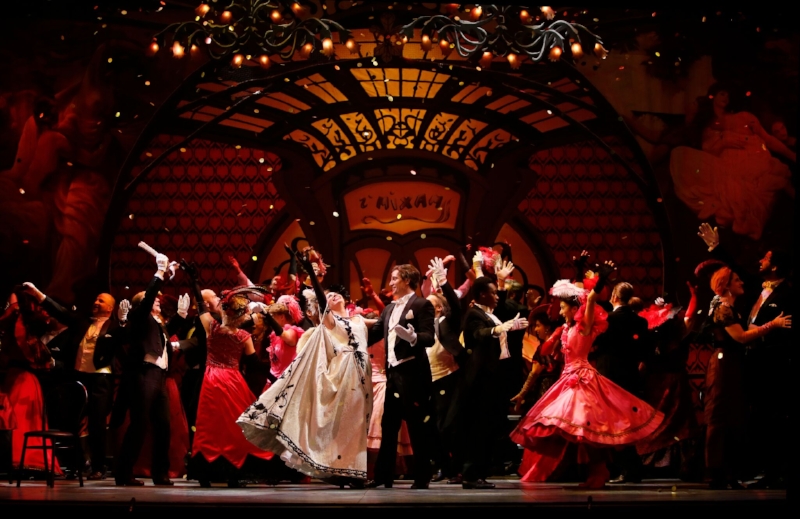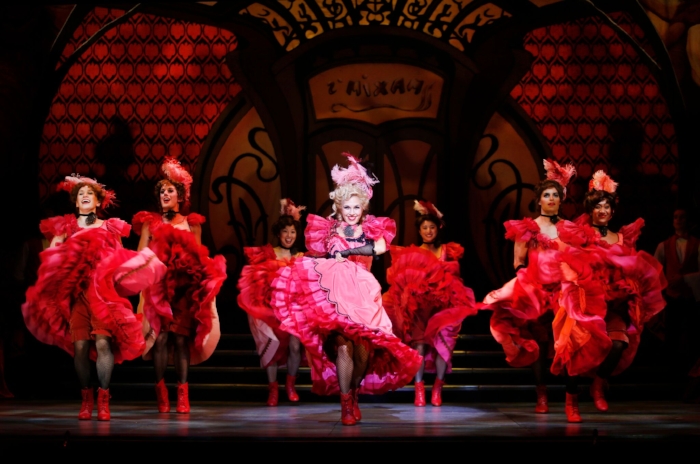Vancouver Opera has outdone itself with its dazzling production of Franz Lehár’s The Merry Widow. This lighthearted operetta, written by Franz Lehár, will be a delightful treat for many theatre fans. It features dynamite performances, and some of the most spectacular sets and costumes I’ve ever seen onstage. But the heart of this production is the masterful craftsmanship of director Kelly Robinson, and choreographer Joshua Beamish.
Robinson and Beamish have created an over-the-top theatrical experience where audiences are transported to 19th century Paris in all its glory, complete with grand ballrooms, beautiful evening gowns, dapper suits, can-can dancers, and everything else you would expect. This operetta, sung in German and featuring English dialogue between songs, is tongue-in-cheek. And Robinson and Beamish’s delivery of this piece is perfectly en pointe – deliciously entertaining, comical, and unapologetically borrowing from the musical theatre realm.
Lucia Cesaroni as Hanna, “The Merry Widow”. Photo credit: Tim Matheson
The story centres around Hanna, a young widow from the fictitious Balkan country of Pontevedro. Hanna’s late husband left her with twenty million francs – plus she’s young and hot – so you can only what a hot commodity she is among men. She arrives in Paris as a guest of a ball hosted by Baron Mirko Zeta. He’s from Pontevedro – in fact he’s the Ambassador – and his ploy is to get Hanna to marry a Pontevedrian man, so her money will stay within the poverty-stricken nation. And in fact, Zeta already has a potential suitor in mind for Hanna – the dashing Count Danilo Danilovitch.
Hanna is feisty and clever. Danilo is an arrogant womanizer. It’s clear from the start the two won’t get along. Or will they? The Merry Widow screams rom com from start to finish, and it’s so much fun. I’m not an expert on the history side of things, but The Merry Widow could very well have been one of the first modern-era romantic comedies presented onstage. If that’s the case, then it’s even more amazing to see this well-renowned operetta brought to life with such energy and freshness.
Lucia Cesaroni and the male ensemble. Photo credit: Tim Matheson
Soprano Lucia Cesaroni is fantastic in the role of Hanna. Her vocal technique and delivery, acting, stage presence and movement is stellar. Perhaps the highlight of her singing in the show is her rendition of the Vilja song, where she serenades the local Parisians with a song about a mythical forest fairy. The depths of Cesaroni’s talents are on full display here, as she evokes tenderness, power, and an air of mystery in her storytelling. She demonstrates tremendous vocal control and range in this number.
Cesaroni performing the Vilja song in act two. Photo credit: Tim Matheson
Tenor John Cudia’s bold vocal delivery and stage presence compliments Cesaroni wonderfully. An interesting aspect of this show is that it requires its singers to be legit opera singers – yet they have to deliver dialogue as well. And the style of the show – theatrical and comedic - requires the actors to perform in a musical theatre style. So in a sense, they have to be opera singers and musical theatre performers. And Cudia and Cesaroni nail all of this.
Plus, their chemistry is off the charts. They play off each other fabulously. Every time Cesaroni takes a dig at Cudia, she lights up and he gets noticeably frustrated. The love/hate relationship between the two leads is very cute.
Lucia Cesaroni and John Cudia. Photo credit: Tim Matheson
The supporting characters and chorus are excellent in this production as well, accompanied by the Vancouver Opera Orchestra under the conduction of Ward Stare. As none of the singers, including the leads, wear microphones, I was impressed with how well the performers project and annunciate their dialogue. During the first act, I was up in the balcony and could easily hear all of the dialogue.
Cesaroni and the male dancers. Photo credit: Tim Matheson
One of the best elements of this production is the dancing, thanks to choreographer Joshua Beamish and the talented group of dancers assembled. Beamish’s choreography, both on the dancers and on the singers is clever and really adds to the enjoyment of the show.
One of the crowd-pleasing numbers is a piece in the second act featuring some of the men characters. The slapstick humour-inspired choreography and excellent cast performances deliver old school musical theatre charm, to the delight of the audience. And speaking of comedy, Hanna and Danilo later charge into a hilariously aggressive national dance of their “fatherland” (completely fictional of course).
One of the show’s highlights is the rousing can-can number. Photo credit: Tim Matheson
But the highlight of Beamish’s choreography is the rousing can-can number in the third act, with standout dancer Sierra Brewerton. Kudos to male dancers Walter Kubaneck and Ted Littlemore who have sneakily kicked their way into the chorus line of girls, and look fabulous doing so.
And of course, there are the magnificent visuals of the show, thanks to scenic designer Michael Yeargan, costume designer Susan Memmott Allred, and lighting designer Gerald King. I don’t believe I’ve ever seen a show in Vancouver with visual designs of this calibre.
John Cudia and the female ensemble. Photo credit: Tim Matheson
The first act is set in a gorgeous black-and-white themed ballroom, with an elegant, grand, staircase, where Hanna, dressed in a fiery red dress makes her entrance. The second act takes us to the beautiful streets of Paris, with warm lights glowing from within the buildings, under the towering presence of leafy trees. And the third act takes us to a smoke and mirrored filled French salon, complete with exquisite chandeliers, detailed décor, and the authentic can-can dancer costumes.
While The Merry Widow is ton of laughs, there’s a feistiness about the story’s message that I love. It’s about a woman who is sharp-witted and courageous enough to not fall victim to the misogynistic culture of the times. Along with the wonderful performances, clever staging, and luminous visuals, Vancouver Opera has set a new standard in this town. I spent my summer in Broadway theatres and at the Metropolitan Opera House in New York, and I personally feel that Vancouver Opera’s The Merry Widow rivals the shows I saw. The Merry Widow is a merry good time from start to finish.
Vancouver Opera’s The Merry Widow runs until October 28 at the Queen Elizabeth Theatre. Visit Vancouver Opera’s website for more information.







